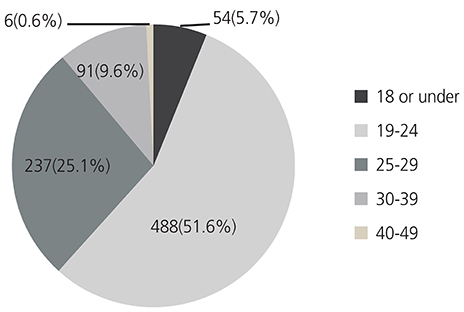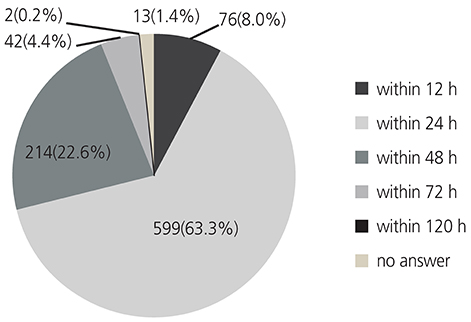Obstet Gynecol Sci.
2019 May;62(3):173-178. 10.5468/ogs.2019.62.3.173.
The attitudes of Korean physicians toward emergency contraceptive pills: regarding women's access and rescheduling
- Affiliations
-
- 1Department of Obstetrics and Gynecology, Soonchunhyang University Seoul Hospital, Soonchunhyang University College of Medicine, Seoul, Korea. elsee165@gmail.com
- KMID: 2445075
- DOI: http://doi.org/10.5468/ogs.2019.62.3.173
Abstract
OBJECTIVE
This study investigated the attitude of Korean physicians toward women's access to emergency contraceptive pills (ECPs) and the reclassification of ECP to a behind-the-counter (BTC) drug.
METHODS
This study involved 946 physicians who had prescribed ECP in South Korea. The written questionnaires were completed by obstetricians and gynecologists, family physicians, internal medicine doctors, and pediatricians.
RESULTS
Regarding the barriers limiting women's access to ECP, 24.8% of physicians responded that women lacked information about ECP and 22.5% felt that women were likely to be emotionally burdened by visits to clinics or hospitals to obtain ECP prescriptions. Ninety-two percent of physicians responded that ECP should remain a prescription drug while 6.1% stated preferences for a switch to a BTC drug. Physicians who opposed the switch were concerned about the potential abuse of ECP. In order to prevent ECP abuse, the most important factor to be considered was education on contraception.
CONCLUSION
A majority of Korean physicians opposed the reclassification of ECP to a BTC drug owing to their belief in increasing the role of educational initiatives about contraception and contraceptive practices before improving the access to ECP. This study is also of the opinion that contraceptive education for youth and adults in Korea should be more realistic and active, with an emphasis on regular contraception use before reclassification. Furthermore, we believe that efforts are needed to ensure accuracy of information on contraception to facilitate women's access to ECP.
MeSH Terms
Figure
Reference
-
1. Kim DS, Kim YT, Lee SY. Debates and implications on contraception and abortion policy: focusing on women's reproductive health right. Seoul: Korean Women's Development Institute;2014.2. Lee JH. Korea's contraceptive use rate of 3%, ‘the world's lowest’ [Internet]. Daegu: Digital Economy;c2014. cited 2014 Dec 8. Available from: http://www.deconomic.co.kr/news/articleView.html/?idxno=5492.3. Choi JS, Chae SM, Park E, Seo K. Policy issues on abortion in Korea. Seoul: Korea Institute for Health and Social Affairs;2010.4. Lee IS, Choi GY, Cha SH, Park HY, Lee JJ. A survey on the sexual behavior of adolescents in South Korea: the third survey in 2007. Korean J Obstet Gynecol. 2010; 53:512–519.
Article5. Jun MH. Teenager surge in emergency contraceptive pill [Internet]. Seoul: Yonhapnews;c2016. cited 2016 Sep 23. Available from: http://www.yonhapnews.co.kr/bulletin/2016/09/23/0200000000AKR20160923039000017.6. Lee MY. Premature discussion of emergency contraceptive reclassification [Internet]. Seoul: Kukmin Ilbo;c2011. cited 2011 Aug 12. Available from: http://news.kmib.co.kr/article/view.asp?arcid=1313167470&code=14131301&sid1=all.7. Koo B, Lee IY, Lee IS, Chang MJ, Jung SY, Choi EM, et al. Research on the utilization patterns, knowledge, perceptions and attitudes of Korean women on contraceptives. Osong: Korean National Institute of Drug Safety Evaluation;2015.8. Shen J, Che Y, Showell E, Chen K, Cheng L. Interventions for emergency contraception. Cochrane Database Syst Rev. 2017; 8:CD001324.
Article9. Richardson AR, Maltz FN. Ulipristal acetate: review of the efficacy and safety of a newly approved agent for emergency contraception. Clin Ther. 2012; 34:24–36.
Article10. Gemzell-Danielsson K, Rabe T, Cheng L. Emergency contraception. Gynecol Endocrinol. 2013; 29:Suppl 1. 1–14.
Article11. Lee JK, Schwarz EB. The safety of available and emerging options for emergency contraception. Expert Opin Drug Saf. 2017; 16:1163–1171.
Article12. Gemzell-Damielsson K, Berger C, Lalitkumar PG. Mechanisms of action of oral emergency contraception. Gynecol Endocrinol. 2014; 30:685–687.13. Min SJ. Getting a prescription for emergency contraception in Korea [Internet]. Seoul: Sisacast;c2016. cited 2016 May 20. Available from: http://www.sisacast.kr/news/articleView.html?idxno=11659.14. Kiechle M, Neuenfeldt M. Experience with oral emergency contraception since the OTC switch in Germany. Arch Gynecol Obstet. 2017; 295:651–660.
Article15. IQVIA. Oral contraceptive consumption volume: IMS sales audit as of Q4 MAT, IQVIA data [Internet]. Durham (NC): IQVIA;c2016. cited 2016 Sep 23. Available from: https://www.iqvia.com.16. IQVIA. Oral contraceptive consumption volume: IMS MIDAS as of Q4 MAT, IQVIA data [Internet]. Durham (NC): IQVIA;c2016. cited 2016 Sep 23. Available from: https://www.iqvia.com.17. International Consortium for Emergency Contraception. EC status and availability-countries with non-prescription access to EC, ICEC data [Internet]. New York (NY): International Consortium for Emergency Contraception;c2018. cited 2018 May 11. Available from: http://www.cecinfo.org/country-by-country-information/status-availabilitydatabase/countries-with-non-prescription access-to-ec.18. Lee HJ, Kang HS. Rates and methods of contraception among Korean adolescents from 2007 to 2009. Korean J Women Health Nurs. 2011; 17:148–156.
Article19. Hwang SW, Chung CW. Contraception behavior and related factors in unmarried female and male. Korean J Women Health Nurs. 2011; 17:77–87.
Article20. Kim E, Lee I, Lee S. Study about the experience of the sex education and the perception of the contraceptive pill of the female adolescent. J Korean Bioethics Assoc. 2016; 17:53–74.21. Kang HS. Perceptions of emergency contraceptive pills among young Korean women. Korean J Women Health Nurs. 2006; 12:124–131.
Article22. UBcare. Projected outpatient prescription volume from 2013 to 2017 [Internet]. Seoul: UBcare;c2018. cited 2018 May 11. Available from: https://www.ubcare.co.kr.
- Full Text Links
- Actions
-
Cited
- CITED
-
- Close
- Share
- Similar articles
-
- Unmarried Mother's Knowledge and Attitudes toward Emergency Contraceptive Pills
- Clinical use of oral contraceptives
- How Does Advance Provision of Emergency Contraceptives Affect Contraceptive Use and Sexual Activity Among Adolescents? Systematic Review and Meta-Analysis
- Continuation Rates, Complaints and Reasons for Discontinuance Relating to Contraceptive Pills: An Indian Experience
- Perceptions of Emergency Contraceptive Pills among Young Korean Women



